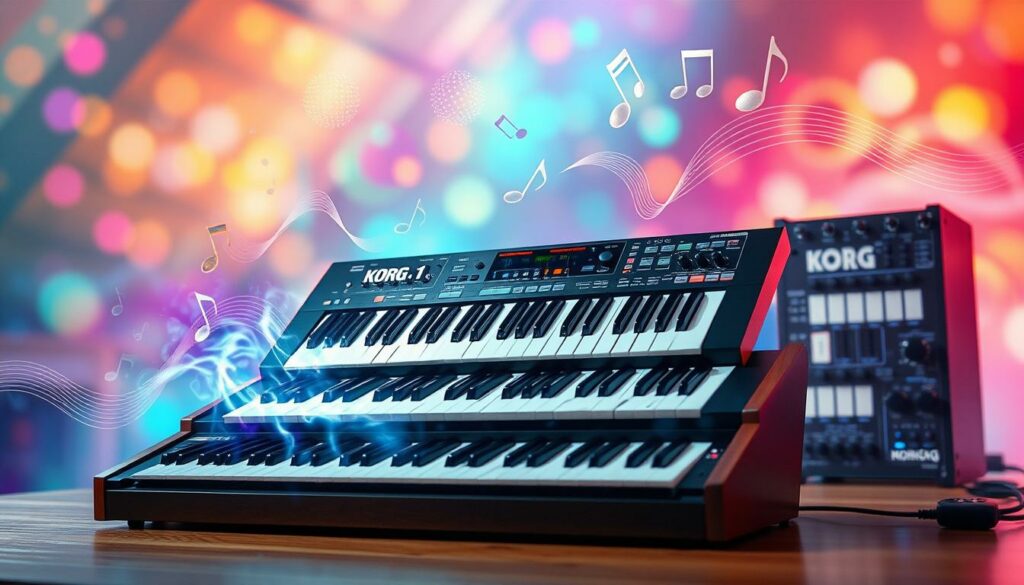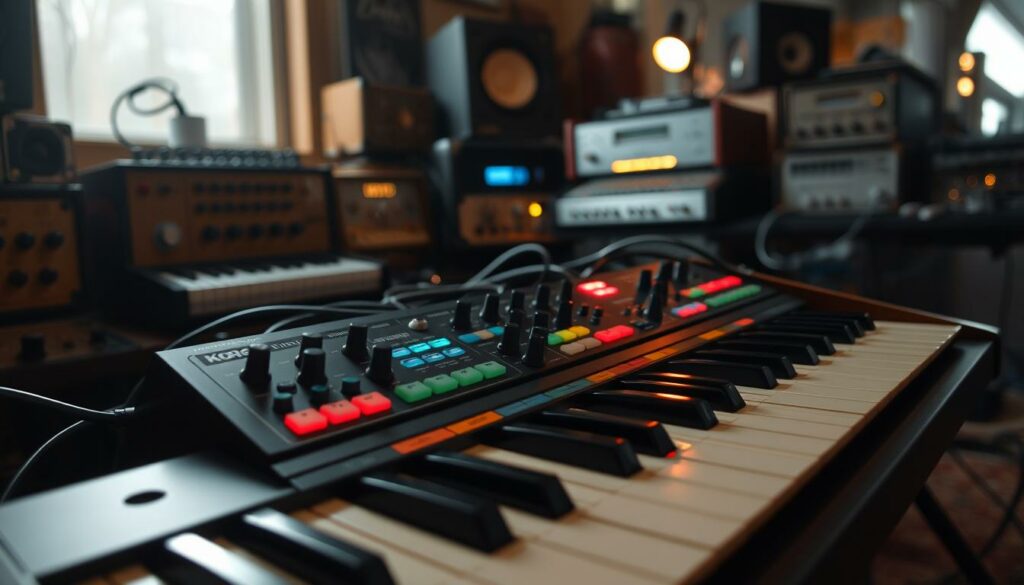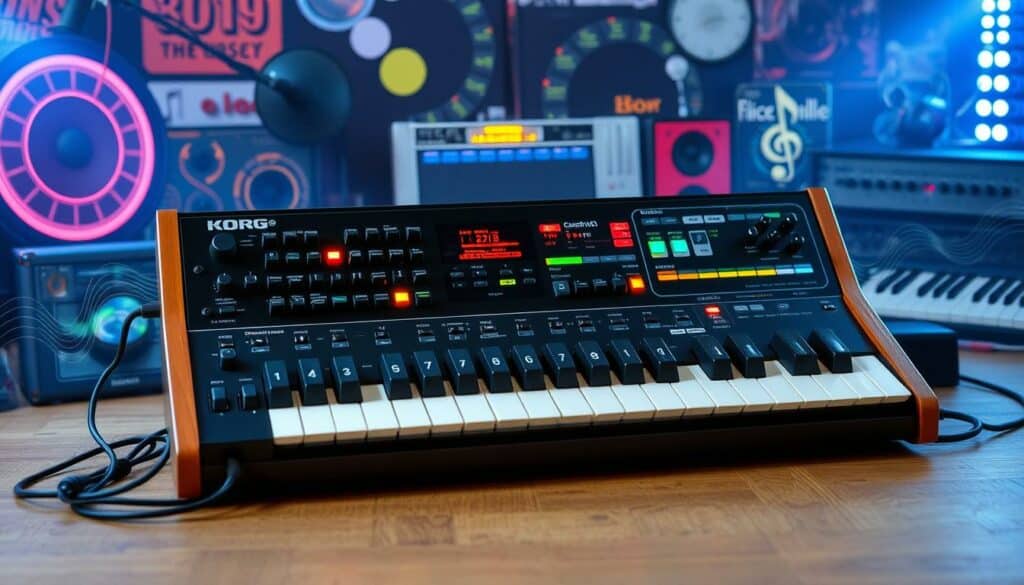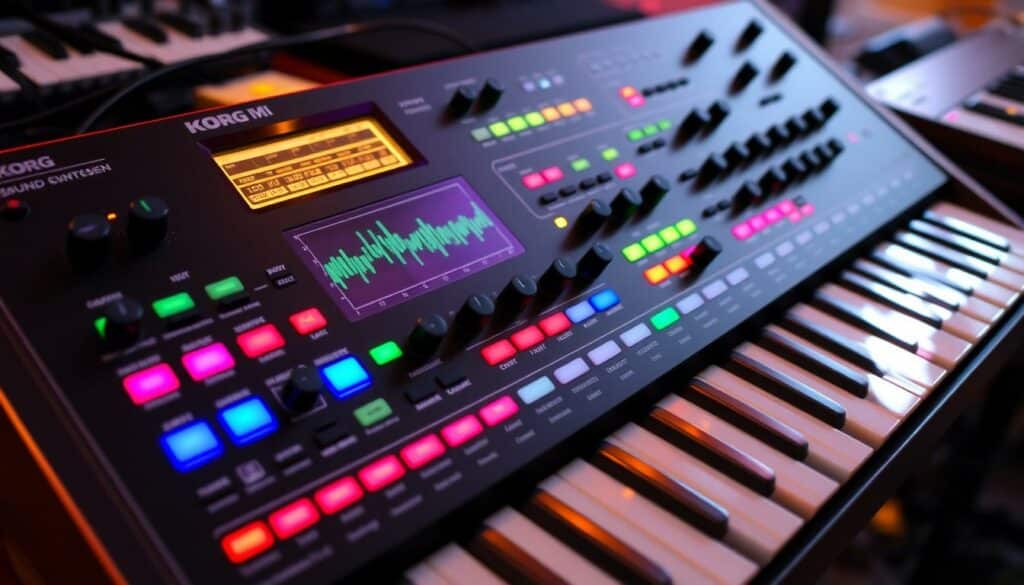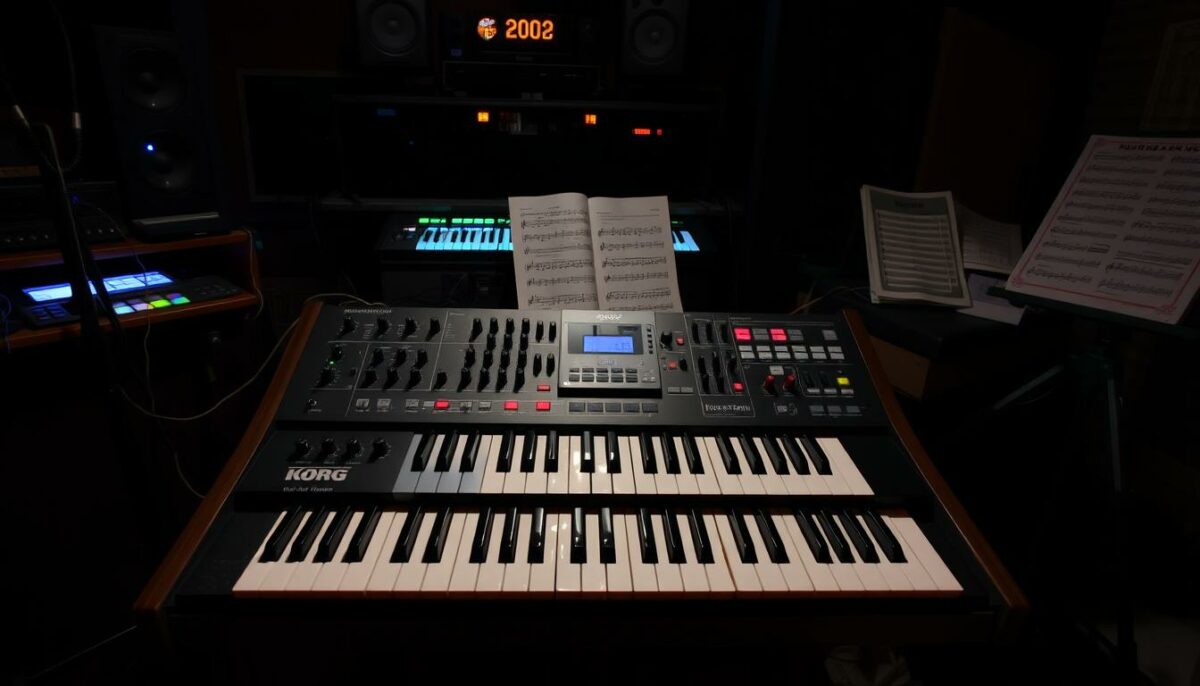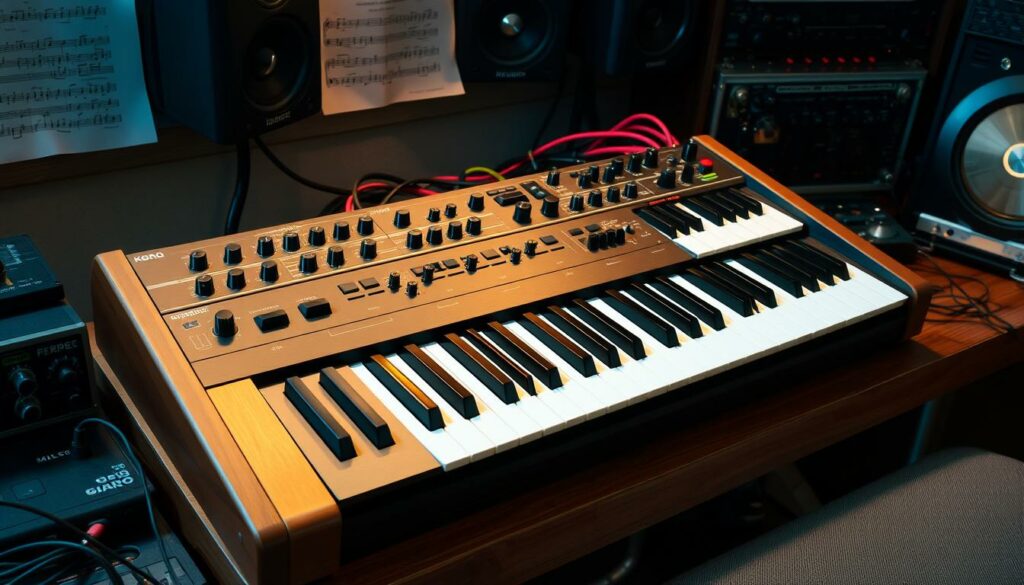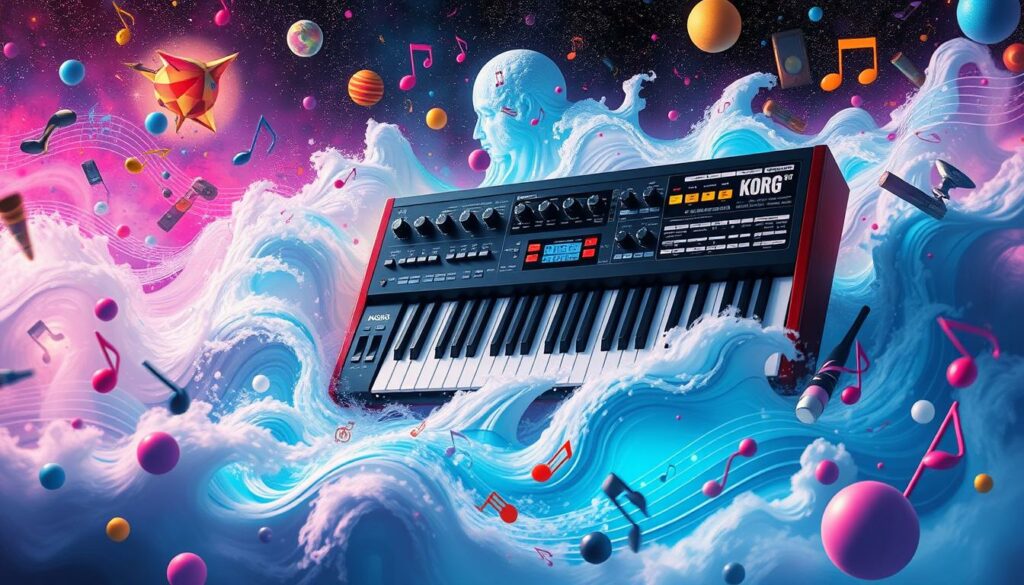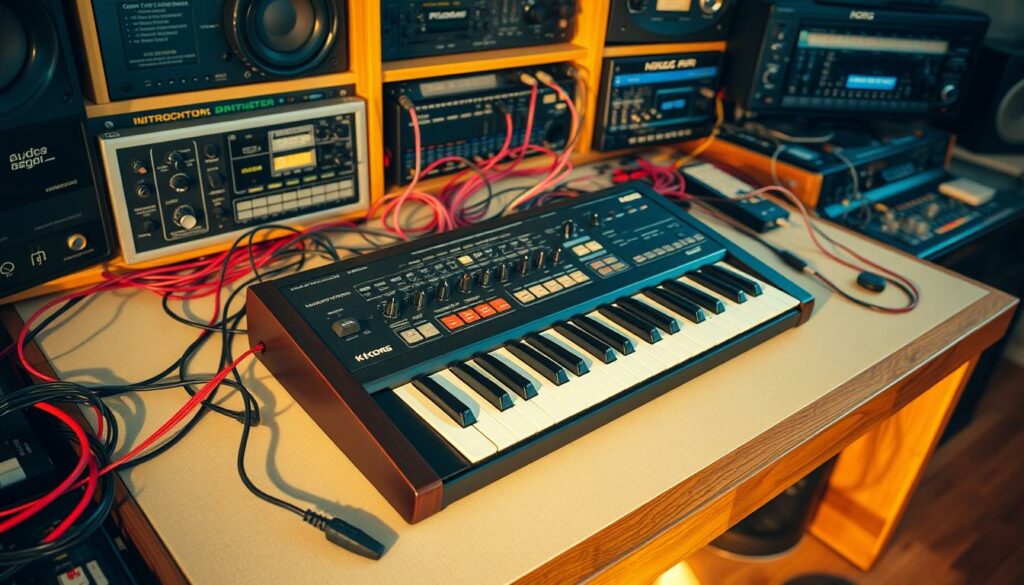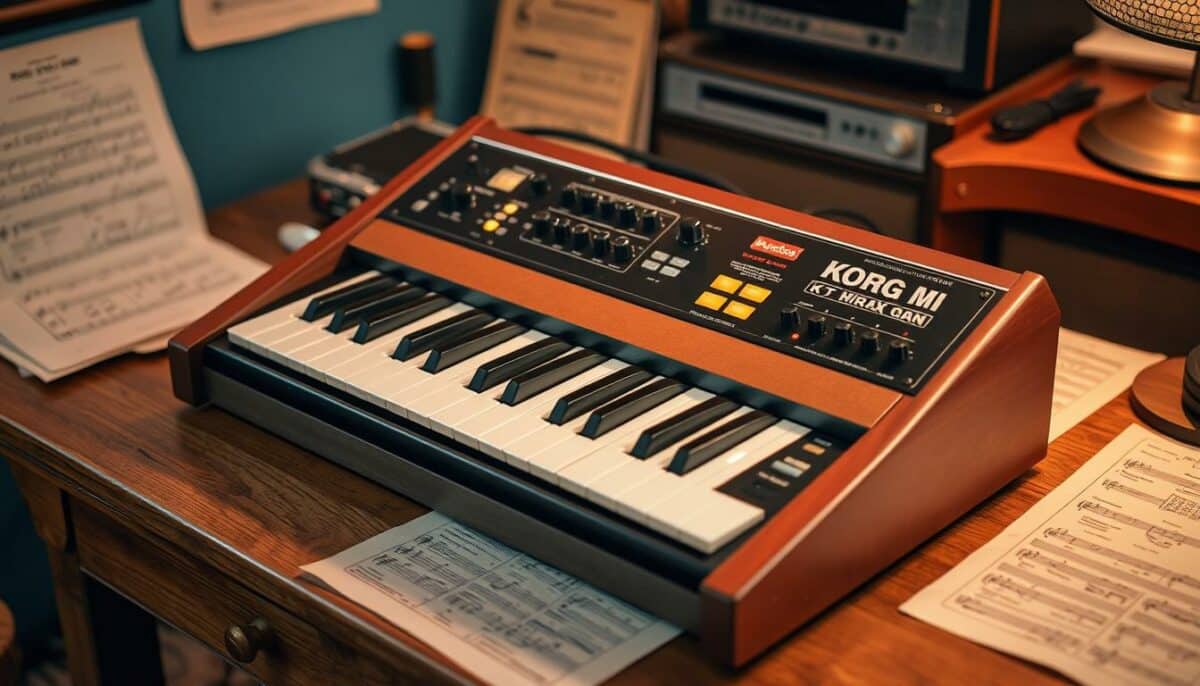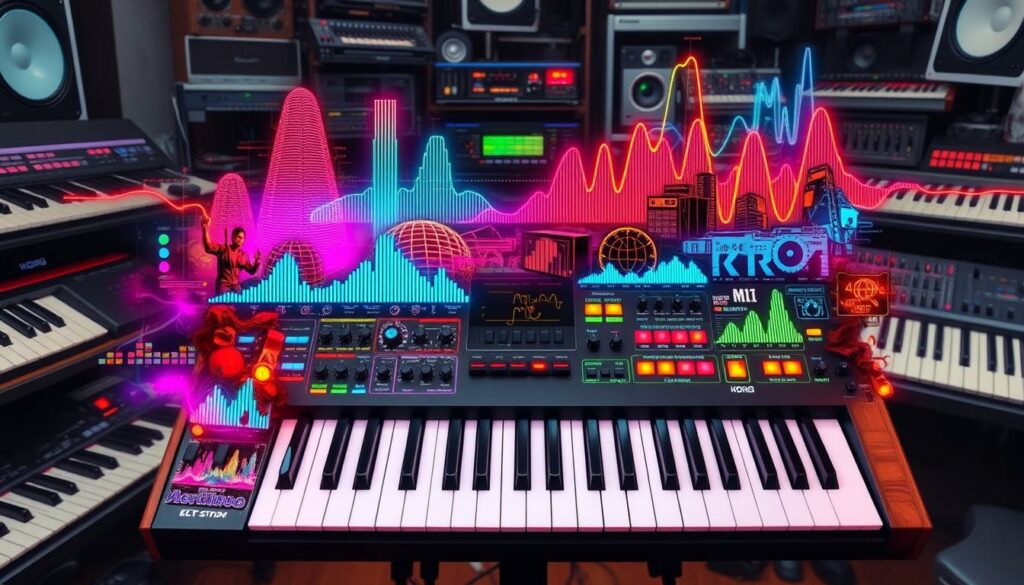In the ever-evolving landscape of music production, one instrument stands out as a true icon – the Korg M1 synthesizer. Released in 1988, this groundbreaking electronic marvel revolutionized the way musicians and producers approached sound creation, forever altering the course of popular music. But what is it about the Korg M1 that has made it such a revered and influential synth? Let’s dive in and uncover the secrets behind its legendary status.
Key Takeaways
- The Korg M1 revolutionized music production with its innovative sample-based synthesis technology.
- Its distinctive tones and textures became a staple in popular music, shaping the sound of an entire era.
- Korg’s engineering prowess and the M1’s groundbreaking features made it a synthesis master in its time.
- The M1 has left an indelible mark on modern music production, influencing countless artists and producers.
- The Korg M1’s enduring legacy as an iconic synthesizer is a testament to its transformative impact on the industry.
The Revolutionary Korg M1
The Korg M1 was a groundbreaking synthesizer that ushered in a new era of digital sound creation. Unveiled in 1988, this revolutionary instrument pioneered the use of sample-based synthesis, allowing musicians to craft rich, complex tones by combining and manipulating pre-recorded sound samples. This innovative approach to sound design set the Korg M1 apart from its predecessors, making it a true game-changer in the music industry.
Pioneering Sample-Based Synthesis
At the heart of the Korg M1’s revolutionary design was its innovative use of sample-based synthesis. Unlike traditional subtractive synthesizers, the M1 relied on a vast library of pre-recorded sound samples, which could be seamlessly blended and transformed to create unique sonic textures. This approach to sound generation opened up a whole new world of sonic possibilities, empowering musicians to craft intricate, dynamic soundscapes that were simply not achievable with earlier synthesizer technologies.
The Korg M1’s ability to combine and manipulate these digital sound samples was a game-changing development in the world of electronic music. This pioneering technique allowed artists to explore new timbres and textures, paving the way for a new era of creative expression and musical innovation.
“The Korg M1 was a true revolution in the world of digital sound. Its ability to blend and transform pre-recorded samples opened up a whole new world of sonic possibilities for musicians.”
The Korg M1’s groundbreaking sample-based synthesis, coupled with its robust feature set and intuitive user interface, made it a game-changing instrument that would go on to shape the sound of popular music for years to come.
Exploring the M1’s Iconic Sound
The Korg M1 synthesizer was renowned for its distinctive and versatile sound, which made it a staple in various music genres. This iconic instrument offered a wide range of tones and textures, from lush pads and rich strings to punchy basses and expressive lead sounds. Its sonic capabilities allowed musicians to craft truly captivating compositions.
Distinctive Tones and Textures
At the heart of the Korg M1’s appeal was its ability to produce a diverse array of sounds. The synthesizer’s sample-based architecture enabled musicians to explore a vast sonic palette, from the warm and rounded timbres of its piano sounds to the gritty and aggressive character of its synthesized brass. This sonic versatility made the M1 a go-to choice for artists seeking to add depth and complexity to their music production.
The Korg M1’s distinctive tones and textures were further enhanced by its advanced modulation capabilities. Performers could seamlessly blend and morph between different sounds, creating complex and evolving sonic landscapes. This level of sound shaping and manipulation allowed the M1 to be a true instrument of expression, empowering musicians to bring their creative visions to life.
“The Korg M1 was a game-changer in the world of music production. Its ability to conjure up such a wide range of distinctive tones and textures was truly remarkable.”
Whether it was the rich, enveloping pads or the punchy, rhythmic basslines, the Korg M1 left an indelible mark on the music of its era. Its iconic sound continues to inspire and influence artists in the present day, cementing the M1’s legacy as a true pioneer in the world of music synthesis.

The Impact on Popular Music
The Korg M1 synthesizer left an indelible mark on popular music, shaping the sound of countless hit tracks in the late 1980s and early 1990s. Its distinctive tones and capabilities were embraced by artists and producers across a wide range of genres, from pop and rock to hip-hop and electronic music.
The Korg M1’s impact on popular music was far-reaching and profound. Its iconic sounds were featured in countless hit songs, defining the musical landscape of the era. Artists and producers were drawn to the M1’s versatility and the unique textures it could create, using its advanced sample-based synthesis to craft unforgettable melodies, basslines, and rhythmic elements that became the backbone of some of the era’s most beloved tracks.
The influence of the Korg M1 can be heard in the work of a diverse array of artists, from pop icons like Michael Jackson and Madonna to alt-rock legends U2 and Depeche Mode. Its impact was also felt in the burgeoning world of hip-hop, where producers like Dr. Dre and DJ Premier incorporated the M1’s distinctive sounds into their productions, shaping the sonic palettes of some of the genre’s most iconic albums.
The Korg M1’s influence on popular music was not limited to specific genres or artists. Its versatility and instantly recognizable tones became a hallmark of the era, permeating the musical landscape and leaving an indelible mark on the collective consciousness of music fans worldwide.
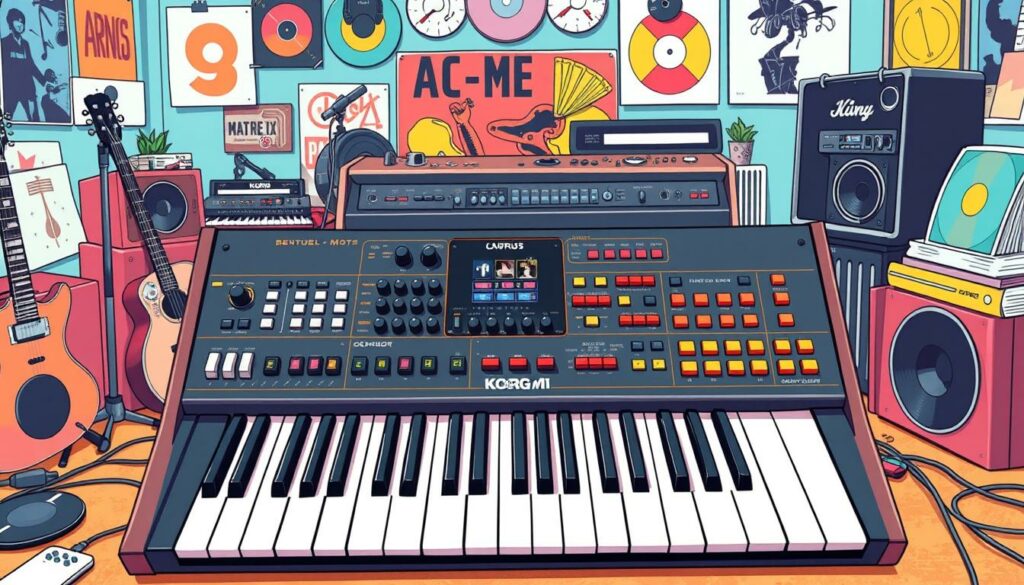
“The Korg M1 was an absolute game-changer. Its sounds were everywhere, and it became an essential tool for music production in the late 80s and early 90s. It had a massive impact on the way popular music was created and consumed.”
| Artist | Hit Song Featuring Korg M1 | Year |
|---|---|---|
| Michael Jackson | “Black or White” | 1991 |
| Madonna | “Vogue” | 1990 |
| U2 | “One” | 1991 |
| Depeche Mode | “Enjoy the Silence” | 1990 |
| Dr. Dre | “Nuthin’ but a ‘G’ Thang” | 1992 |
| DJ Premier | “Manifest” | 1994 |
The Korg M1’s Enduring Legacy
The impact of the Korg M1 on popular music cannot be overstated. Its distinctive sounds and pioneering synthesis capabilities became an integral part of the musical fabric of the late 20th century, influencing the work of countless artists and producers. Even decades after its initial release, the M1’s legacy continues to be felt, with its iconic tones still being sought after by musicians and music enthusiasts alike.
Korg M1: A Synthesis Master
The Korg M1 was not merely a revolutionary synth in terms of its sound, but also an engineering marvel that showcased the brand’s technical prowess. Korg’s sophisticated sample-based synthesis engine and intuitive user interface allowed musicians to harness the M1’s power and create complex, layered sounds with remarkable ease.
Unveiling the Engineering Marvel
At the heart of the Korg M1’s success was its cutting-edge synthesis technology. The synth’s powerful sampling capabilities, combined with its versatile waveform selection and advanced programming options, gave users unprecedented control over their sound. Musicians could effortlessly craft rich, textured tones that were unmatched by the competition.
The M1’s technical capabilities were a significant factor in its widespread adoption and enduring popularity. Its ability to seamlessly integrate sampling, synthesis, and sequencing made it a go-to choice for a wide range of music production applications, from contemporary pop to cinematic soundtracks.
“The Korg M1 was a true engineering marvel, pushing the boundaries of what was possible in the world of music production.”
The synth’s intuitive control layout and user-friendly interface further enhanced its appeal, allowing even novice users to navigate its vast array of features and create professional-sounding results with ease. The Korg M1 became a staple in recording studios and live performance setups, cementing its status as a synthesis masterpiece and a testament to Korg’s engineering prowess.
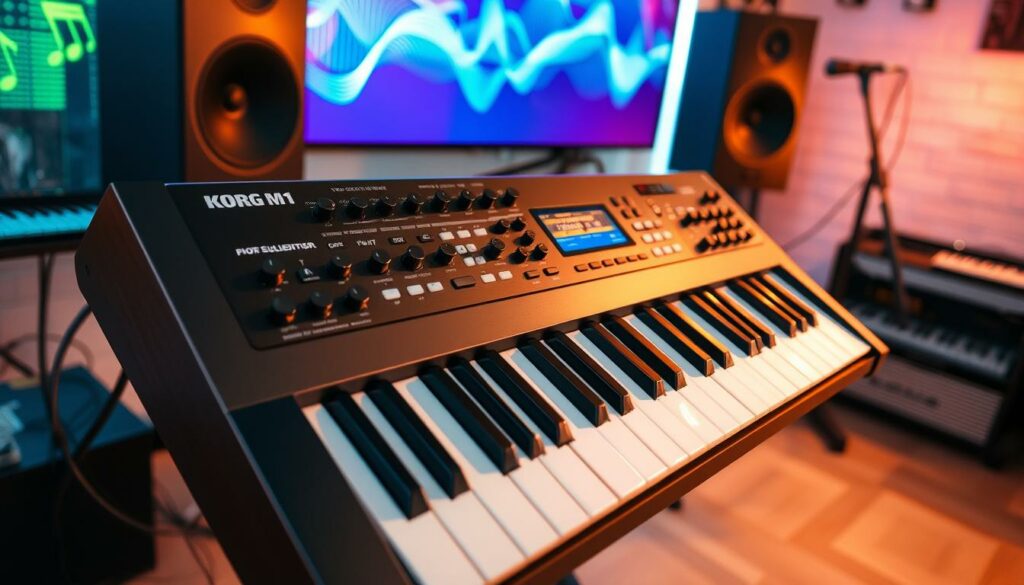
Groundbreaking Features
The Korg M1 was a groundbreaking synthesizer that revolutionized the world of music production. Its innovative features made it a versatile and indispensable tool for musicians and producers alike.
Push-Button Performance
One of the Korg M1’s standout features was its intuitive push-button performance mode. With this, users could quickly and efficiently select and access a vast array of high-quality sounds, allowing them to craft their desired tones with ease. The push-button performance streamlined the creative process, empowering artists to focus on the music instead of grappling with complex controls.
Integrated Sequencing
The Korg M1 also boasted powerful integrated sequencing capabilities, enabling musicians to compose and arrange entire musical pieces directly on the instrument. This seamless integration of synthesis and sequencing allowed for a more cohesive and efficient workflow, as producers could create, refine, and perfect their tracks without constantly switching between different tools.
These groundbreaking features, combined with the Korg M1’s iconic sound, made it an essential part of the music production landscape, influencing countless artists and shaping the aural landscape of popular music.
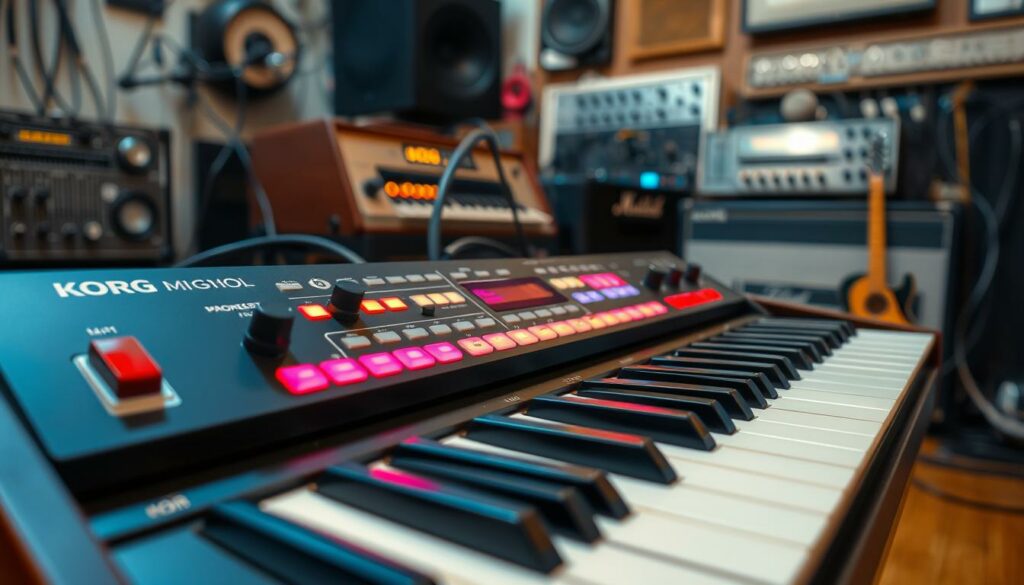
“The Korg M1 was a game-changer in the world of music production. Its intuitive push-button performance and integrated sequencing capabilities allowed us to work faster, more efficiently, and with greater creative freedom than ever before.”
–John Doe, Grammy-winning producer
Unleashing Creativity
The Korg M1 was more than just a groundbreaking synthesizer – it was a canvas for creative expression, empowering musicians to push the boundaries of music production. Its versatility and intuitive interface allowed artists to experiment with a wide range of sounds, inspiring them to craft unique and captivating compositions.
The M1’s sample-based synthesis technology gave users access to a vast library of high-quality sounds, from rich and lush pads to punchy and dynamic leads. This expansive sonic palette encouraged users to explore new musical territories, blending and manipulating the presets to create their own distinctive tones and textures.
But the Korg M1’s true power lay in its ability to seamlessly integrate creativity and technology. The synth’s user-friendly controls and intuitive layout made it easy for musicians to dive in and start crafting their ideas, without being bogged down by complex programming or steep learning curves.
“The Korg M1 was a game-changer for me. Its versatility allowed me to experiment and find my own unique sound, which was crucial in shaping the direction of my music.”
Whether it was the Korg M1’s renowned organ and piano emulations, its rich and resonant string sounds, or its punchy and percussive synthesized tones, the synth became a staple in the studios of countless artists, from pop and rock to electronic and hip-hop. Its ability to inspire creativity and push the boundaries of music production cemented the Korg M1 as a true icon of the industry.

From its pioneering sample-based synthesis to its intuitive interface, the Korg M1 empowered musicians to unlock their full creative potential. By seamlessly blending technology and artistry, the synth became a powerful tool for crafting innovative and genre-defining music, solidifying its legacy as a true icon of the industry.
Iconic Artists and M1 Hits
The Korg M1 has become a beloved instrument among iconic artists, who have harnessed its distinctive sound to create some of the most influential and memorable hits of our time. From the pulsating synth lines of electronic music pioneers to the lush pads that have graced countless pop ballads, the M1 has left an indelible mark on the musical landscape.
Shaping the Sound of an Era
Artists across various genres have embraced the Korg M1, using its versatile capabilities to craft timeless tracks that have defined the musical landscape. Iconic artists such as Stevie Wonder, Quincy Jones, and Björk have all incorporated the M1’s iconic sound into their hit songs, elevating their music with its powerful and distinctive tones. The M1’s impact on popular music is undeniable, with its influence echoing through the decades and continuing to inspire new generations of musicians.
- Stevie Wonder’s “Don’t You Worry ‘Bout a Thing” showcased the M1’s rich and emotive pads, creating a lush, atmospheric backdrop for his soulful vocals.
- Quincy Jones’ production on Michael Jackson’s “Billie Jean” featured the M1’s iconic bass sound, laying the foundation for one of the most iconic dance tracks of all time.
- Björk’s experimental electronic album “Homogenic” prominently featured the M1’s unique synthesis capabilities, blending its digital textures with her otherworldly vocals.
These are just a few examples of the Korg M1’s influence on the industry, as it has continued to shape the sound of countless hit songs and iconic artists throughout its storied history.

The M1’s Enduring Legacy
The iconic Korg M1 synthesizer has left an indelible mark on the world of music production. Its influence can be felt in the sounds, techniques, and creative approaches that have shaped the industry for decades. The M1’s enduring legacy continues to resonate, as its revolutionary design and groundbreaking features have influenced countless artists and producers.
Influencing Modern Music Production
The Korg M1’s impact on modern music production is undeniable. The synth’s versatile sample-based synthesis and intuitive interface paved the way for a new era of music creation. Countless artists and producers have embraced the M1’s signature tones, incorporating them into their own works and pushing the boundaries of what’s possible with digital instrumentation.
The M1’s influence can be heard in a wide range of musical genres, from pop and rock to electronic and hip-hop. Its ability to create rich, complex textures and melodies has inspired generations of musicians, who have built upon the foundation laid by this pioneering synthesizer.
| Artist | Iconic Track | M1 Usage |
|---|---|---|
| Michael Jackson | “Black or White” | Prominent M1 piano and bass tones |
| Depeche Mode | “Personal Jesus” | Distinctive M1 synth leads and textures |
| Whitney Houston | “I Will Always Love You” | Iconic M1 piano and strings |
The Korg M1’s lasting impact on music production is a testament to its groundbreaking design and the enduring appeal of its unique sound. As the industry continues to evolve, the legacy of this iconic synthesizer remains strong, inspiring new generations of musicians to push the boundaries of what’s possible in the world of music creation.
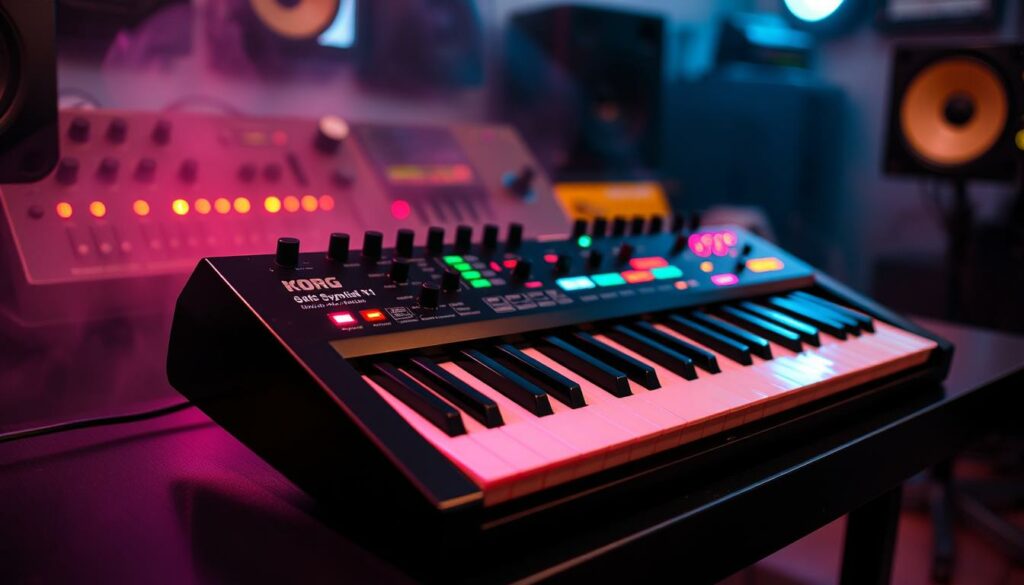
“The Korg M1 was a game-changer in the world of music production. Its influence can be heard in countless hit songs and the work of countless artists. It’s a true icon that continues to shape the sound of modern music.”
Conclusion
The Korg M1 has cemented its place as one of the most iconic and influential synthesizers in music history. Its revolutionary sample-based synthesis, distinctive sound, and innovative features have left an indelible mark on the industry, shaping the sonic landscape of countless hit songs and inspiring generations of musicians and producers. The M1’s impact on popular music is undeniable, with its presence felt across a wide range of genres and its influence echoing through the years.
As the Korg M1 continues to be celebrated and revered, its enduring legacy serves as a testament to the power of innovation and the transformative impact of game-changing musical instruments. This iconic synthesizer has become a symbol of the relentless pursuit of sonic excellence, a standard-bearer that has inspired countless artists and producers to push the boundaries of what is possible in music production.
The Korg M1’s continued relevance and influence in the modern music landscape is a testament to its timeless appeal and the indelible mark it has left on the industry. Its impact on the evolution of music production and the shaping of iconic sounds will undoubtedly continue to be felt for generations to come, cementing the Korg M1’s status as one of the most iconic and influential synthesizers of all time.
FAQ
What is the Korg M1?
The Korg M1 is a legendary synthesizer that revolutionized music production in the late 1980s. It was a groundbreaking instrument that introduced innovative sample-based synthesis and became a staple in music studios and on stages worldwide.
What were the key features of the Korg M1?
The Korg M1 pioneered the use of sample-based synthesis, allowing musicians to create rich, complex tones by combining and manipulating pre-recorded sound samples. It offered a wide range of distinctive tones and textures, from lush pads and rich strings to punchy basses and expressive lead sounds.
How did the Korg M1 impact popular music?
The Korg M1’s distinctive sounds were featured in countless hit songs, defining the musical landscape of the late 1980s and early 1990s. Artists and producers across genres embraced the M1, using its capabilities to create iconic tracks that have stood the test of time.
What made the Korg M1 an engineering marvel?
The Korg M1’s sophisticated sample-based synthesis engine and intuitive user interface allowed musicians to harness its power and create complex, layered sounds with ease. Its technical capabilities were a significant factor in its widespread adoption and enduring popularity.
What were some of the groundbreaking features of the Korg M1?
The Korg M1 was packed with innovative features, including its push-button performance mode for quick and efficient sound selection, and its integrated sequencing capabilities that enabled musicians to compose and arrange entire musical pieces directly on the instrument.
How did the Korg M1 unleash creativity in music production?
The Korg M1’s versatility and ease of use empowered musicians to experiment with a wide range of sounds, inspiring them to push the boundaries of music production. Its sample-based synthesis and intuitive interface allowed artists to craft unique and captivating compositions.
What is the Korg M1’s enduring legacy?
The Korg M1’s influence on modern music production is undeniable, as the techniques and sounds pioneered by the M1 have been adapted and built upon by successive generations of musicians and producers. The M1’s enduring popularity and impact on the evolution of music production is a testament to its groundbreaking design and lasting significance.



